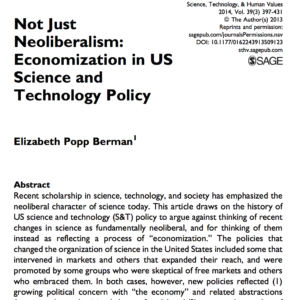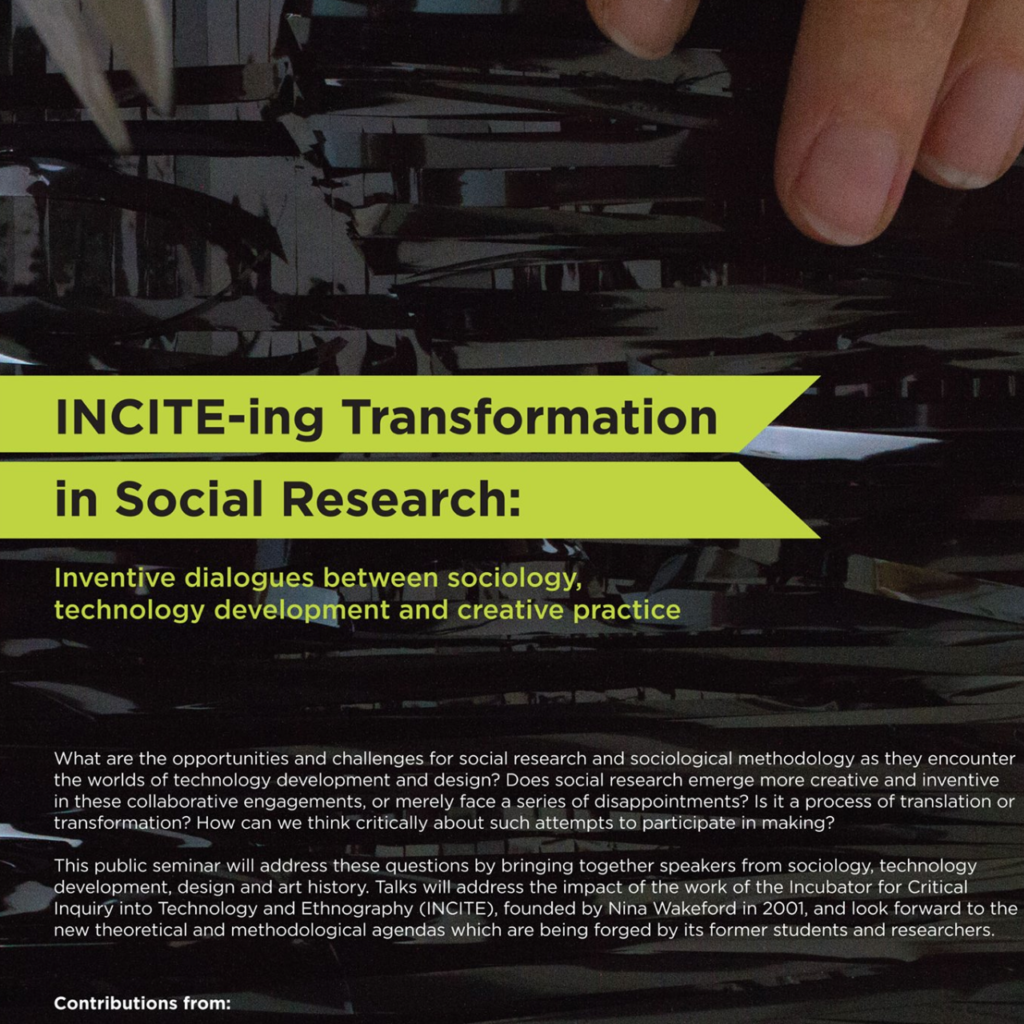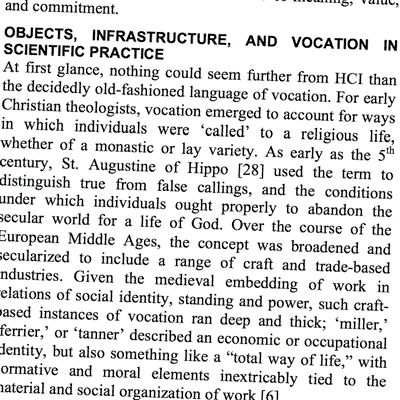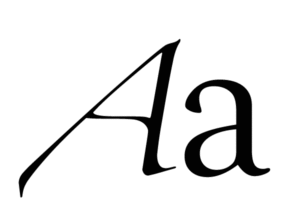I wanted to write a short note about Noortje Marres’ book . (more…)
Tag: STS
Reading ‘Nothing comes without its world’: thinking with care
Reading María Puig de la Bellacasa’s article on feminist notions of care. (more…)
Reading “ANT, multiplicity and policy”
Some notes on:
Law, J., & Singleton, V. (2014). ANT, multiplicity and policy. Critical Policy Studies, 1–18.
Reading “Not just neoliberalism…”
Berman, E. P. (2014). Not Just Neoliberalism: Economization in US Science and Technology Policy. Science, Technology & Human Values, 39(3), 397–431.

The title of this paper says it all really. It’s good though to have a cogent argument about the relations between ideology, policy and the changes in how science is being done. I for one very easily slip into an accusatory refrain when talking about and usually criticising what I’ve seen to be the neoliberal (non)interventionist and policy direction in education and science. Elizabeth Berman presents a much more measured position and convinces me that it’s better understood as an economization, as she calls it, where the broader shift is towards prioritising scientific research and innovation vis-a-vis the economy and specifically seeing them as economic inputs. This recognises the tensions and complications and the competing interests that have run through the changing status of the sciences (in the US, but similarly, I think, in the UK).
Something I think Berman leaves open is the relationship between science and innovation. She makes it clear that science and innovation become inexorably linked when science is seen in economic terms. I want, though, to better understand the nexus. Indeed, but conflating science and technology (“S&T” as Berman refers to it), I think there are further complications here that need unraveling, ones pointing to the entanglements of science and technology, and where progress or innovation sits between (or around) them. Can we talk of technology without innovation? If S&T are two-parts of a unit, how can we disentangle innovation?
Talk at INCITE-ing Transformation in Social Research

On Saturday (12 Oct) I presented a short paper reflecting on INCITE’s achievements over the last 10 or so years at “INCITE-ing Transformation in Social Research”
Preamble
Referencing her New Media’s Intermediaries article, I want to glimpse back to reflect on how Nina Wakeford positioned INCITE and made sense of it against a back drop of cultural theory, science and technology studies, CSCW and sociology
.. And, in doing this, I also want to peer forward, to consider what troubles there might be ahead, and what productive possibilities we might imagine for ourselves. (more…)
Announcing Tenison Road launch

Finally posted some flyers to announce the launch of the big data project we’ll run for a year. We hope to work with the residents and proprietors on Tenison Road in Cambridge to better understand how big data matters and what people on the street want it to be. This is a project that is aiming to get at the interminglings of data and locality, and to intervene in the entanglements in productive ways. That’s the hope! … Fingers crossed.
Short note on ‘Objects, Infrastructure and Vocation’

Infrastructure and Vocation: Field, Calling and Computation in Ecology
A brilliant CHI paper by Steven Jackson and Sarah Barbrow. How many papers presented at CHI cite St. Augustine of Hippo and, to boot, succeed in drawing out relevant reflections on scientific modelling tools in ecology. Seeing ecology through the lens of both infrastructure and the ‘vocational calling’ provides a productive view onto what ecologists do and how their practices are changing. Jackson and Barbrow illustrate this nicely by writing of the changing notion of ‘the field’ for ecologists. I see a strong parallel here between ecology and biology. Biology is a field very much in transition and the changes have much to do with the material encounters in biological work — with for example the changing nature of biologists’ work at ‘the bench’ and with experimental apparatus. The turn to machines, computation and algorithms is not only reshaping the practices but also refiguring what biologists know and how they see their phenomena (something we also tried to get across in At the interface of biology and computation at CHI). A similar conclusion is being drawn out in this papers as it captures the entangled relations between the tools, practices and ways of knowing in ecology.
On always already

The phrase “always already” is, in the main, attributed to the poststructuralist philosopher Jaques Derrida. It has, however, come to be a trope for the new materialists and it is in this usage that I modestly take it on. Specifically, my guiding sources are from the feminist technoscience scholars Donna Haraway and Karen Barad, both of whom make heavy use of the phrase to trouble the binaries abound in science and technology (subject-object, mind-matter, inside-outside, past-present, etc.).
For some back ground reading see The New Materialist “Always Already”: On an A‑Human Humanities.